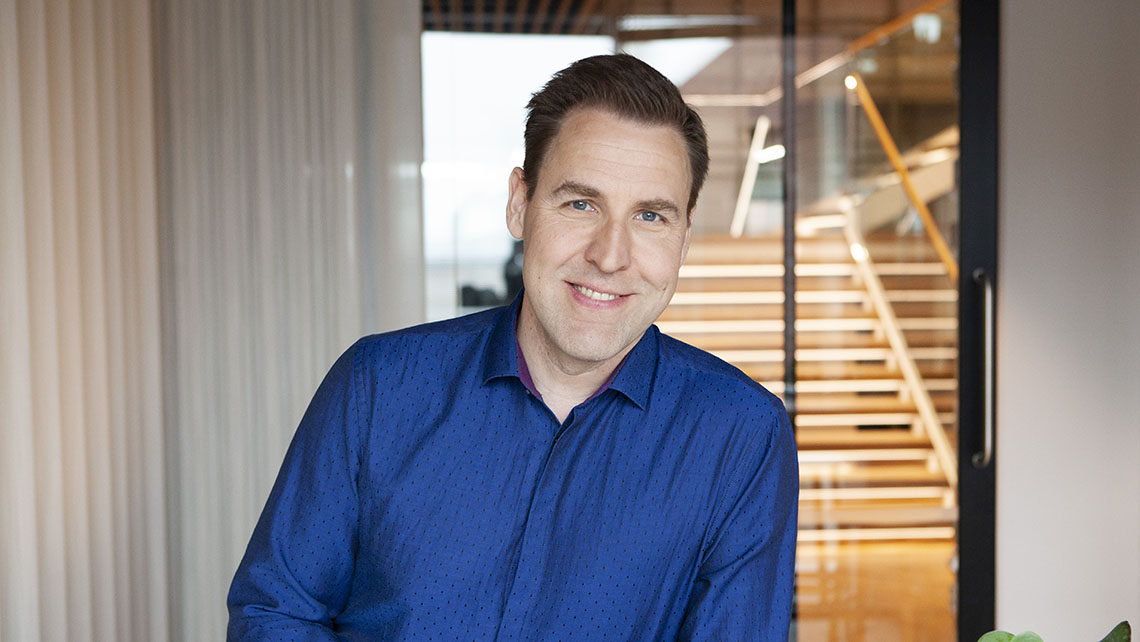Fully in the game
As a Research Fellow, Dr. Marko Kolari views his role as great recognition for his efforts at Kemira over the last 20 years. Dr. Kolari lives by a “fully in the game” philosophy and gives every project everything he has to see it succeed and has the same expectation of those around him. He also sees himself as a mentor to his colleagues and enjoys sharing his experience to help them meet their full potential.
Marko joined Kemira in 2004 as part of a small team focused on microbiology. The team set its ambitions high wanting to innovate groundbreaking, best-in-world microbiological control for the pulp and paper industry. That ambition has taken this small product line from its humble beginning to over 50 M€ per/year in global revenue, and a strong position especially among those customers that have the highest requirements for performance, such as hygienic board grades. Says Marko, “As a scientist I have always tried to focus on things that have an impact and earning recognition as a Research Fellow shows me that the company also believes I am doing the right things, values my work and sees the impact.” This type of engagement fuels the team to focus on the most impactful things.
Matthew Pixton, Kemira’s Chief Technology Officer sees the Research Fellow role as aspirational. It demonstrates to the Kemira organization that there is a progressive technical career path for research scientists and that strong technical performance, risk taking, innovation and project delivery will be rewarded.

Kemira’s R&D center in Espoo, Finland
Innovation – from collaboration to commercialization
As Research Fellow, Marko believes his most crucial role is as a catalyst to drive innovation. Over 20 years ago an university professor shared words of wisdom with Marko on how innovation is born, and Marko has evidenced those being valid. Innovation requires 4 things; background knowledge, a clear understanding of the customer, both their process and unmet needs, an innovative mindset with a willingness to take risks, and finally internal pressure from the organization to make innovation happen. If one of these is missing, it doesn’t play.
Collaboration plays an important role in innovation. “I have had good collaboration around the world both within the organization and with external stakeholders,” comments Marko. In order to ensure we are not developing products that have low value, or are not addressing an unmet customer need, or are having adverse side effects, we have to work very closely with our applications and commercial team. It’s not just about innovation, it’s the whole team staying fully in the game for as long as it takes to prove the product commercially successful with customers.
For Marko, the ability to build trust facilitates collaboration. “People know that I will always bring my best to a project and I have built this trust making the collaboration easy,” says Kolari. “People seem to appreciate my ideation and it inspires others to work with me and while I might be the idea man, no idea becomes a successful product without teamwork.”
We should always be looking ahead and challenging ourselves to improve in areas where we are not as strong as we could be.
Another must have for innovation is identifying opportunities. “We should always be looking ahead and challenging ourselves to improve in areas where we are not as strong as we could be,” states Marko. In this regard, he is focused on 3 main avenues of innovation. The first is to continue growing our biocides offering for the paper industry. Secondly, we want to successfully commercialize new technologies included in our development roadmap for recycled linerboard. Finally, we want to improve our capabilities in autoadaptive dosing of chemical products, to take new digital opportunities into wider use.
Marko has very broad experience and invention across 35 different patent families. When asked about innovation drivers at Kemira, he once again highlights understanding customer needs. In his view, all scientists need to have some possibilities for customer interface. This combined with scientific curiosity and innovative thinking gives us a good platform to innovate. We have already proven we can solve challenges. For our paper customers for example we have developed microbiological control chemistries to improve hygiene of food-packaging board, and provide slime control without creating costly corrosion problems for machinery.
Our past shapes our future
“Within R&D, our history has been in virgin fiber and more recently recycled fiber, where I’d like to see us continue building best-in-world competence,” Marko comments. He is also looking for a stronger push in biobased innovation where development is already ongoing.
I personally feel that the biggest impact we can make is by focusing on fiber-based alternatives for plastic and helping to make and keep our oceans plastic-free.
Our biobased innovation targets are a large part of our broader sustainability strategy and for us, this is a must-win. Companies who can succeed in transforming will also be the companies who succeed in the long term. Becoming more sustainable will not be an easy undertaking for the world at large and there are many different fronts in the battle. Kolari says, “I personally feel that the biggest impact we can make is by focusing on fiber-based alternatives for plastic and helping to make and keep our oceans plastic-free. From an environmental standpoint, the collapse of the marine ecosystems would be a nightmare. Kemira already has a lot of fiber knowledge and I believe that great R&D in this field could have the biggest handprint on a global scale, compared to other sustainability challenges.”
Digitalization is also growing with a lot of focus and activities happening and even more on the horizon. Marko believes this also presents great possibilities for improving our performance in customer processes, but not without some challenges. We can develop all kinds of new analytics and digital services that may be interesting for us and even our customer, but often they provide no measurable value. We have to focus our efforts on those digital tools that provide measurable benefits and value to our customers so that we can also extract value for our effort.
Bringing the vision to life
“I became a scientist based on what motivates me. I want to be working on something that I can take from an idea to real life, creating something whether it is a product, concept or diagnostics that was not there before. A bit like an artist bringing a vision to life,” concludes Marko.


